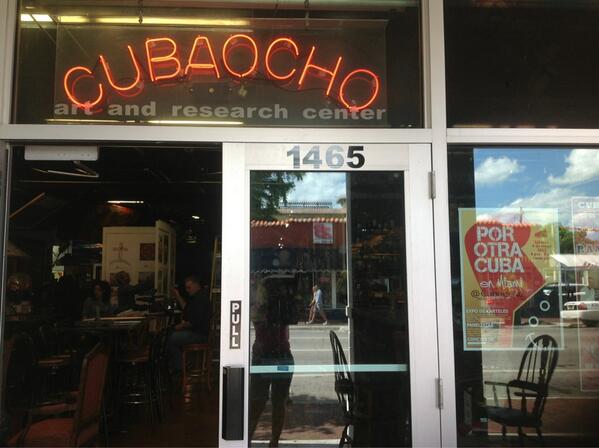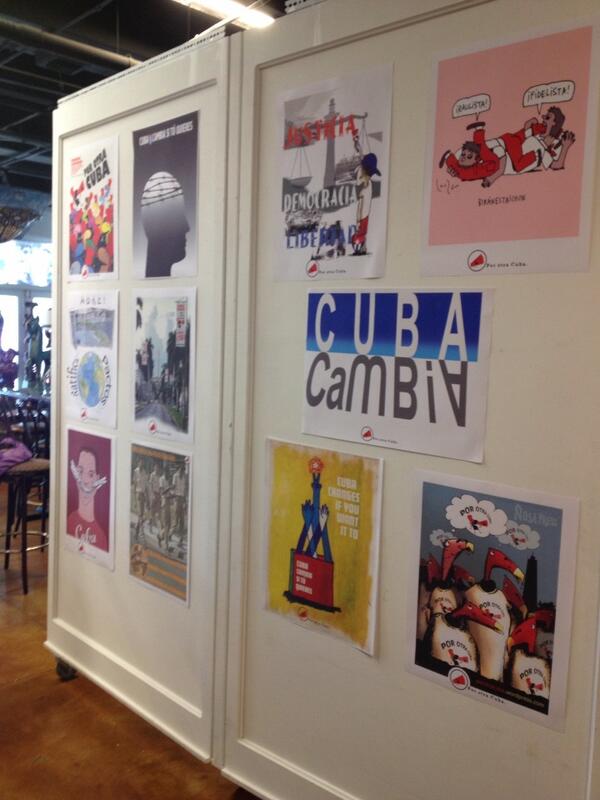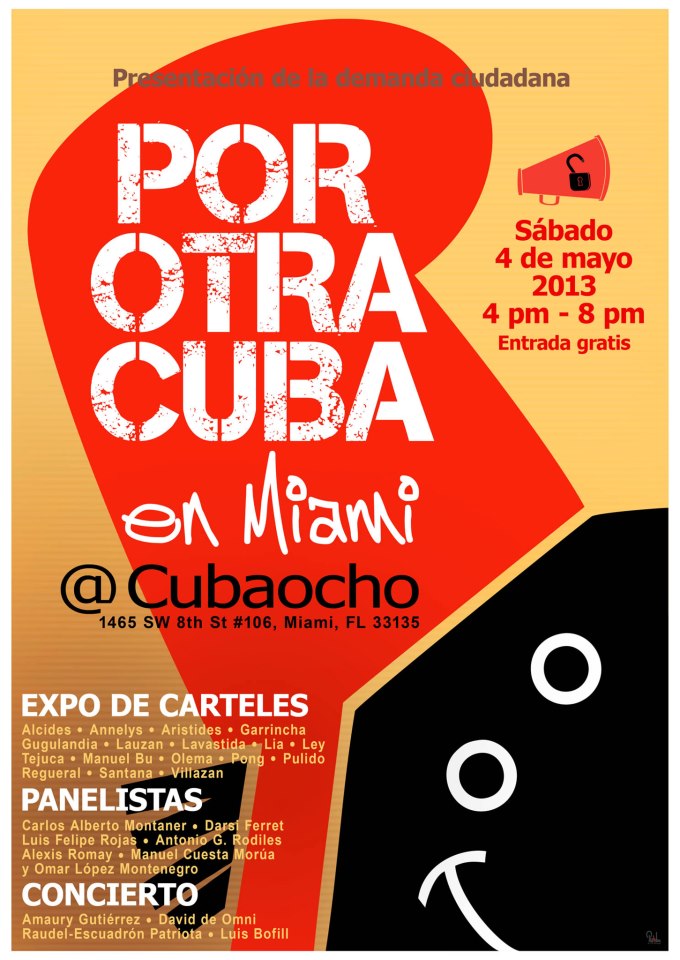
Category: Antonio Rodiles
For Another Cuba, In Miami on Saturday

Presentation of the Demand For Another Cuba. Friday, 4 May 2013, 4-8 pm. Free.
Location: Cubaocho, 1465 SW 8th St. #106, Miami, Florida 33135
Poster Exhibition: Alcides, Annelys, Aristides, Garrincha, Gugulandia, Lauzan, Lavastida, Lia, Ley Tejuca, Manuel Bu, Olema, Pong, Pulido, Regueral, Santana, Villazan.
Panelists: Carlos Alberto Montaner, Darsi Ferrer, Luis Felipe Rojas, Antonio G. Rodiles, Alexis Romay, Mauel Cuesta Morua, Omar Lopez Montenegro.
Concert: Amaury Guitierreez, David de Omni, Raudel-Patriot Squadron, Luis Bofill
1 May 2013
Angel Santiesteban Visited by Family, Appears “OK”
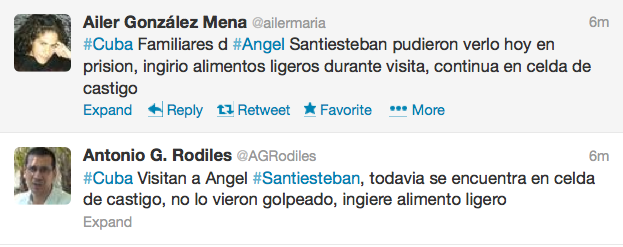 Ailer: Family of Angel Santiesteban able to see him today in prison. He ate light foods during the visit, remains in the punishment cellt.
Ailer: Family of Angel Santiesteban able to see him today in prison. He ate light foods during the visit, remains in the punishment cellt.
Antonio: Visiting Angel Santiesteban, still in a punishment cell, does not look like he was beaten up, eating light foods.
13 April 2013 | about 5:45 pm Havana time
Urgent Call For Proof of Angel Santiesteban’s Well-Being / Antonio Rodiles
Enjoyable Panel on “The World Baseball Classic and Baseball Today” / Estado de Sats
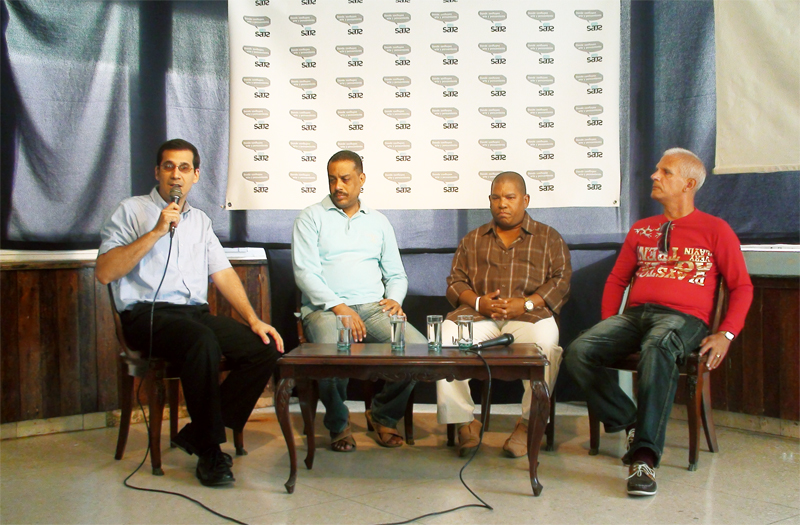
HAVANA, Cuba, April 1, 2013, Pablo Mendez. On Friday March 29 State of Sats held a session on the recently concluded World Baseball Classic at its headquarters on 1st Street between 46 and 60, in the Havana neighborhood of Miramar.
Sergio Girat, administrator of the blog “Major League Baseball Clubs in Cuba,” part of the Cuban Voices Portal platform, gave a brief introduction about the modest results of the Cuban team that participated in the recently concluded World Baseball Classic, passing the microphone to the usual moderator, Antonio Rodiles, who then proceeded to present the panel, composed of Ivan Garcia, Leonardo Calvo and Luis Medina, journalists and knowledgeable bloggers.
The comments focused on the decline in the quality of the principal national pastime, along with to other disciplines such as volleyball, athletics and boxing. Nevertheless, the panelists agreed that despite not fulfilling the prediction of reaching the semifinals in San Francisco, the Cuban team did a good job make it to 5th place. Also, many of those present felt that the national team would have been a strong candidate for the trophy, if the Cuban players had included those with major league contracts.
They recognized that the Dominican Republic and Puerto Rico were revealed as world powers; also the celebration of the World Baseball Classic was a success, despite the constraints imposed by some organizations of for-profit baseball and European supremacy in the official structure of the International Olympic Committee.
As the main drawbacks of the national sport, tactical-technical deficiencies were enumerated, as evidenced by the elevation of the level of play following the entry of professionals in the leads, insufficient nutrition of the athletes, loss of land to practice the sport — only in the city of Havana does it surpass the number 50 — the high prices of sports equipment, absence of the best coaches in the first line, and the disappointment of players because of low incentives, among many other dilemmas.
The majority concluded that the high performance sport demands resources that are not available due to the disastrous economic management of the Cuban Government. Also, all warned that if there’s not an opening for the national sports talents to sign contracts with other leagues, our “baseball,” despite our 150 years of experience, will self-destruct.
This article was written by a good fan of Major League Baseball.

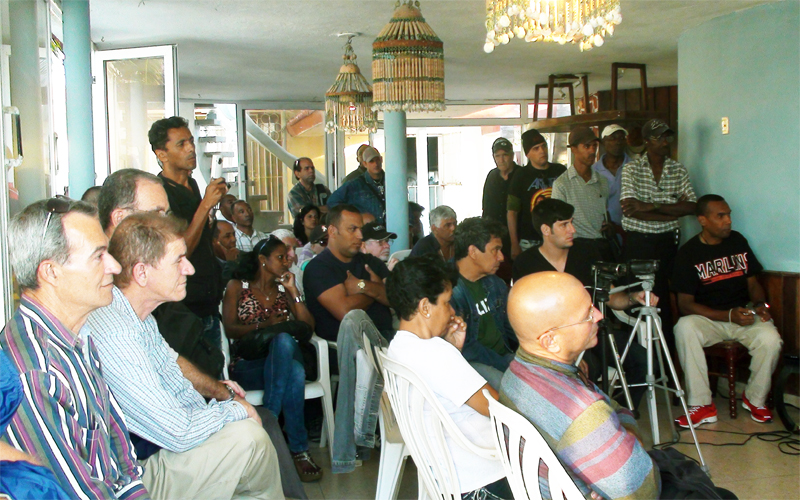

Where is Cuba Headed? / Antonio Rodiles
 Five years ago expectations were high with regards to the selection of the new government elite. Many people speculated about who would be the next first vice president. Bets focused on two candidates: Carlos Lage Davila and Jose Ramon Ventura. Whoever was chosen, observers theorized, would suggest Raul Castro’s orientation over the next five years. Speculations centered on two conflicting approaches: Raulista, or reformist; and Fidelista, or conservative. Apparently, one of them would mark the pace and type of reforms.
Five years ago expectations were high with regards to the selection of the new government elite. Many people speculated about who would be the next first vice president. Bets focused on two candidates: Carlos Lage Davila and Jose Ramon Ventura. Whoever was chosen, observers theorized, would suggest Raul Castro’s orientation over the next five years. Speculations centered on two conflicting approaches: Raulista, or reformist; and Fidelista, or conservative. Apparently, one of them would mark the pace and type of reforms.
The result is not only confirmed in the act of selection, but was signalled when Carlos Lage and his friend Felipe Perez Roque were ousted along with other senior officials. The accusations were known: they betrayed the confidence of the maximum leaders through the improper conduct of “cadres” under their control. It later emerged that on several occasions they had mocked their long-time bosses and that they wanted a greater share of power.
In 2008 the international context was different. Raul Castro attempted to launch a renewed image with the signing the United Nations human rights covenants in New York, along with shallow but widely publicized and promoted reforms. Hugo Chavez had become an inexhaustible source of resources and support for the disastrous economy bequeathed by Fidel Castro. Barack Obama was emerging as the probable next president of the United States, one who would, according to his calculations, widen the chances of ending, or at least relaxing, bilateral differences without his having to give up too much in return. That same year three hurricanes lashed the Island, the precarious economy fell even further, and the dependence on Venezuela deepened. continue reading
Despite the measures taken by the new U.S. administration, the Cuban government offered very timid signs that it wanted to created a new dynamic. Clinging to a society totally controlled by State Security and a huge army of informers, the Cuban government preferred to send a signal of loyalty to those in its pay. In November of 2009 the contractor Alan Gross was arrested to turn him into a bargaining chip for the five spies involved in the hysterical attack that pulverized four Brothers to the Rescue pilots in the air.
The year 2010 brought an outbreak of greater activism from the opposition. The Guillermo Fariñas’ hunger strike, the Ladies in White activism, the death of Orlando Zapata Tamayo’s after a prolonged hunger strike, unleashed strong internal and external pressure around the issue of political prisoners, which ultimately proved unsupportable. The need to put an end to a situation, which by all lights was becoming dangerous, brought about the intervention of the Catholic Church, which served as a liaison between the government and the pro-democracy forces.
Showing signs of political folly, the Government maintained its expectations of achieving favors from the Obama administration at very little cost. According to the counselors of tolitarianism, the “reforms” of the “economic model,” supported by Venezuelan subsidies, would bring about neo-Castroism at an “adequate” pace and without too many tensions.
However, the much-vaunted transformations have not taken off. Foreign investors have not approached, unlike in the ‘90s. The economic dependence on the “brother from the Bolivarian country” – Hugo Chavez – and the death of that Venezuelan president, have shaken the planned scenario.
The Venezuela situation has now become more complicated with its own economy is reeling with soaring inflation and shortages. Chavez’s chosen candidate, Nicolas Madura, is unable to project a sense of confidence in a situation that clearly exceeds his political arsenal.
For the Cuban government, the need for a Plan B is urgent, and all eyes immediately turn to the United States.
The Cuban Government’s Plan B
The Cuban government would need, at the very least, a relaxation of economic sanctions. Only now is the government aware of the magnitude of the mistake it made in imprisoning Alan Gross. The release of the contractor would send the worst possible message to all Cuban secret agents, but would at least guarantee the start of a more fluid process of exchanges, with the final objective of relaxing the embargo. Everything seems to indicate that the old tantrums don’t have the same impact.
Within Cuba, great expectations created by Raul Castro are fading and the government needs to take steps so that Cubans can breathe a little more freedom. Relaxing the controls of the iron-fisted travel and migration policy, in hopes of easing the growing shortages suffered by Cubans, is one of the more “audacious” steps taken by the totalitarians.
The naming of new figures to fill the senior government posts occurred within this scenario. Esteban Lazo, named president of the National Assembly, symbolizes everything about the system that is old and unworkable. He will take the reins of an assembly that has never had a divided vote, not even on the very trivial issues which they discuss. Lazo represents a retaining wall to block any initiative that might arise or come to this governing body.
Substituting Miguel Diaz-Canel for José Ramón Machado Ventura – as first vice president, and presumptive heir – is an attempt to provide a needed succession. Diaz-Canel, younger, obedient, uncharismatic, lacking his own popularity, got the call. A person who will depend entirely on the willing consent of a military apparatus that has strengthened its influence in recent years, indicating that this is the social design intended to be perpetuated. I do not think that these designations generate new dynamics. The elite only intends for these people to execute the plan designed to their and their heirs’ specifications.
The opposition, then, begins to play an interesting role. The collaboration among different groups is ever more articulated. Work in recent months has been woven around the campaign “For Another Cuba,” which demands the ratification and implemention of the United Nations covenants on human rights as a road map for a process of transition, thus signalling that it is possible, here and now, to find a viable path. Civil society is prepared to take bolder steps and we hope this will be the case for all actors.
What can we expect in the short and medium term?
The Government will continue to assign key positions to its most reliable cadres, people who will guarantee that “neo-Castroism” is set in stone. They will also gather a set of bodies who will be allowed to show a certain “renewed” face to the world, and so try to relaunch and normalize their international relations.
This new design requires an economy that can afford it, this is the critical point How can a completely disjointed and broken economy be made viable? This can be achieved only with an injection of capital, an injection that today could come only from our northern neighbor. Nobody wants to invest in a country that doesn’t pay its debts.
The U.S. embargo and the European Community Common Position are key pieces in this political chess game. If the government receives an infusion of resources in the current, unchanged, situation, it would enable it to keep its hyperatrophied repressive apparatus intact and we could say goodbye to our democratic dreams for the next 20 to 30 years. When I hear several pro-democracy actors advocate for the immediate and unconditional end to the embargo, I perceive a lack foresight with regards to the possible political scenarios. Are they unaware of previous experiences in other regions? Are they unaware of the famous phrase, “economic opening with political opening”? Is the massive debt we have already left to our children and grandchildren not enough?
If the democratic community signals the totalitarian government that ratification and implementation of the fundamental rights set out in the UN Covenants is the only path to a solution to the Cuban dilemma, and if it conditions any measure relaxing the economic sanctions to the fulfillment of those international agreements, it will not take long for us to see results.
The Cuban government has not been and is not reckless, still less so in the current context. It is illogical that the elite would want to pass on a time bomb to their family and close associates. The opposition, for its part, in its vast majority, is promoting peaceful change. Changes that transition us to a true democracy with the full and absolute respect of individual liberties, and not the typical totalitarian monstrosity of failed nations. A monster that in the medium term, totally secure, would be burdened with more corruption, more insecurity and more social conflicts.
It is extremely understandable that the Cuban people desire the opportunity to live in peace, to be prosperous, to enjoy their families and their land. We need to leave behind this whole nightmare of warnings of combat, wars of the entire people, territorial militias, socialism or death, and impregnable bastions. We need to overcome crazy ideas like the Havana cordons, microjet bananas, “open airwaves,” battles of ideas, guidelines, and this string of stupidities and mediocrities. Things that have plunged us into this disaster which today we all, absolutely all of us, have the inescapable obligation to overcome. We urge another Cuba.
Antonio Rodiles
The United Nations Covenants, Five Years Later / For Another Cuba, Estado de SATS
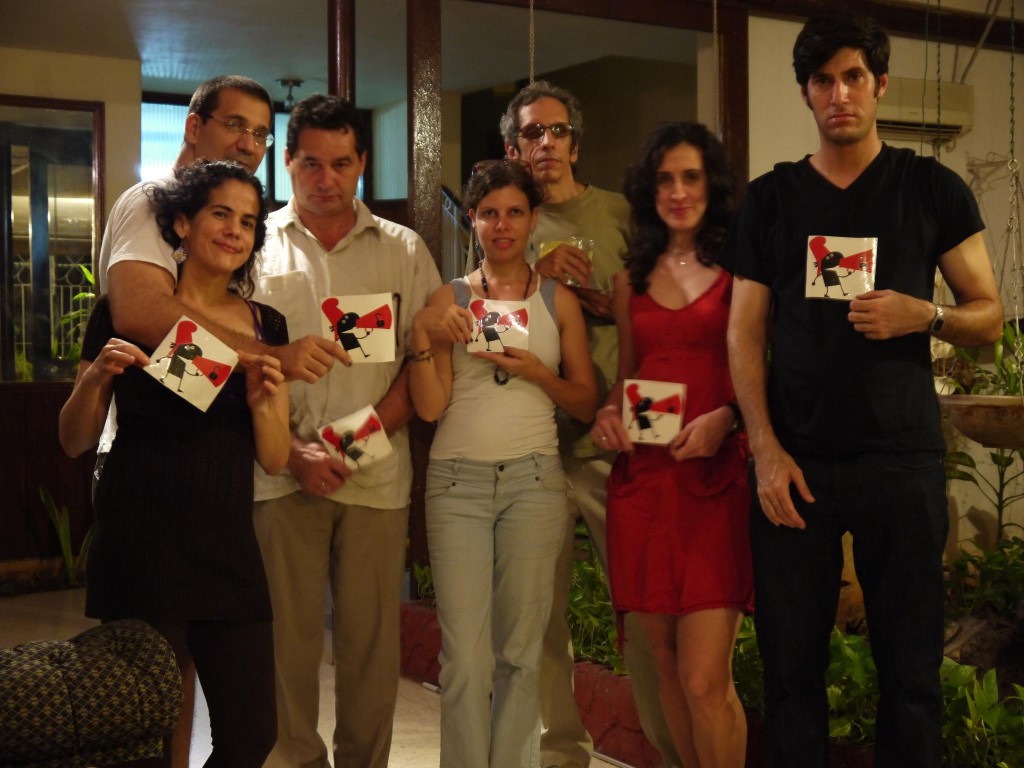
Five years after Cuba’s representative signed the United Nations Covenants on Civil and Political Rights and on Economic, Social and Cultural Rights, the situation with regards to fundamental rights in Cuba remains precarious. The violation of fundamental rights is not only a part of the repressive apparatus of the State, but our national legislation itself imposes restrictions on these freedoms enshrined in international law.
The Cuban Constitution formally recognizes the fundamental freedoms of assembly, association and expression, but immediately establishes limitations that barely allow the exercise of them. The practice of these rights can always be considered contrary to the interests “of the Cuban people to build socialism and communism,” and therefore swept away with great violence and impunity. In short, none of the fundamental rights are legally guaranteed.
To punish these “contrary interests” the Criminal Code provides for sentences of 10 to 20 years in prison or the death penalty for anyone “who, in the interests of a foreign State, commits an act with the intent of undermining the independence of the Cuban State or the integrity of its territory.” continue reading
Another of the offenses widely used to limit the exercise of these rights is the charge of a “propensity” to commit crimes demonstrated by conduct that is in manifest contradiction with the norms of the “socialist morality.” Any police officer may issue an “official warning” against an individual if the officer perceives them to be “dangerous” or to have ties to “potentially dangerous people.” Anyone who has received one or more official warnings may be charged with “dangerousness” and sentenced to up to four years in prison.
Currently still in force is the Law of Protection of National Independence and the Economy of Cuba (Law No. 88) enacted in 1999 by the National Assembly. Law No. 88 provides penalties of 7-15 years in prison for supplying the “enemy” with information that could be useful for strengthening measures against the government of Cuba. The deprivation of liberty may be up to 20 years in the case of information obtained surreptitiously. This law also prohibits the possession, distribution and reproduction of “subversive material,” and establishes prison sentences of up to five years for collaborating with radio stations, television stations or publications deemed to be in the service of foreign powers. The law also imposes unacceptable limits on freedom of association and assembly.
The Cuban State has ratified more than forty international treaties on human rights; however, none of these norms are directly applied to the legal system, principally by the courts. This means that the rights protected by these international norms are, in practice, a “dead letter.”
Total control over all communication media, as provided in the Constitution, includes the written press, radio broadcasts, television or any other means of communication, such that the right to freedom of expression is restricted. Official recognition and registration is denied to unions, civil, professional and human rights associations not belonging to the apparatus of the State or to mass organizations controlled by the government.
Those who try to express their opinions, organize meetings or form associations that contradict the policies of the government or the objectives of the State, are in danger of being subjected to punitive measures such as imprisonment, dismissal, harassment or intimidation.
The arrests and beatings of defenders of human rights, dissidents and political opponents, and independent journalists are common. In some cases they are detained for hours, in others they have been held without charges for months and, on occasion, without trial, on suspicion of participation in activities considered to be counterrevolutionary or for equally vague accusations. In some cases, opponents are summarily tried and sentenced in the space of a few days. Harassment and intimidation of critics and political dissidents and their families at the hands of official groups in so-called “acts of repudiation” constitutes psychological torture, given the tension it can generate for the victims and their families.
Independent local and international human rights NGOs have a great difficulty reporting on human rights violations. The latter are not allowed to visit the island, which contributes to hindering the observation of the human rights situation.
It is incomprehensible that democratic governments embrace a totalitarian system that bears the main responsibility for the disaster befalling our nation. The Cuban people have the right to life, to live and feel pride in their land. Why not listen to us? Why allow us to be covered with a mantle of rhetoric, full of absurd and outdated terms, repression and national ruin?
A true transformation for our people implies, above all, changing laws, regulations and administrative practices that relate to all fundamental freedoms in accordance with international obligations contracted by the Cuban state, as well as the provision of full legal guarantees.
The defense of fundamental rights entails not only an ethical commitment. No society can be viable while ignoring human beings, never before has the nexus between respect for the individual and the development of nations been so clear.
How long should the Cuban people endure the misery associated with the disrespect of our fundamental rights and the imposed material misery that has caused so much pain and damage to our nation? Our country languishes in a calamitous economy with its collapsed infrastructure and an asphyxiating decapitalization. How many more Cubans will have to escape from our country to seek a dignified life in other lands?
For all this, the Campaign for Another Cuba was launched in August 2012, a campaign arising from civil society to demand that the Cuban government immediately ratify and implement the United Nations Covenants.
This effort has been coordinated by hundreds of activists and dissimilar groups the length and breadth of the island, who are working towards regaining our fundamental rights, rights that never should have been severed for any reason. Undoubtedly, this requires the efforts of many pushing from civil society to change a reality that has shown itself to be deeply impervious to change. However we are confident that we will succeed.
We also hope for the just support of the entire regional and international community to exert pressure towards the democratization of our land.
Organizing Committee of the Campaign For Another Cuba:
- Ailer Gonzalez Mena (Artist, State of SATS)
- Alejandro González Raga (former prisoner of conscience, Cuban Observatory of Human Rights)
- Alexis Jardines (Philosophy Professor, State of SATS)
- Angel Moya (former prisoner of conscience, Coordinator Democratic Freedom Movement for Cuba)
- Antonio G. Rodiles (SATS State Coordinator)
- Eduardo Díaz Fleitas (former prisoner of conscience, Pinar del Rio Democratic Alliance)
- Felix Navarro (former prisoner of conscience, Pedro Luis Boitel Democracy Party, Executive Secretary FANTU)
- Guillermo Fariñas (former prisoner of conscience, Spokesman FANTU)
- Iván Hernández Carrillo (former prisoner of conscience, Confederation of Independent Workers of Cuba)
- Jose Daniel Ferrer (former prisoner of conscience, UNPACU Coordinator)
- Jose Diaz Silva (former political prisoner, Opposition Movement for a New Republic)
- Laritza Diversent (CUBALEX)
- Librado Linares (former prisoner of conscience, Cuban Reflection Movement)
- Luis Felipe Rojas (Writer)
- Manuel Cuesta Morua (Progressive Arch, New Country)
- Raul Risco (Pinar del Rio Democratic Alliance)
- Veizant Boloy (Independent Lawyer)
- Yaremis Flores (Lawyer, CUBALEX)
- Rene Gomez Manzano (former political prisoner, Lawyer, Corriente Agramontista Association of Independent Lawyers)
Surprise Appearance by Fidel Castro on Cuban TV
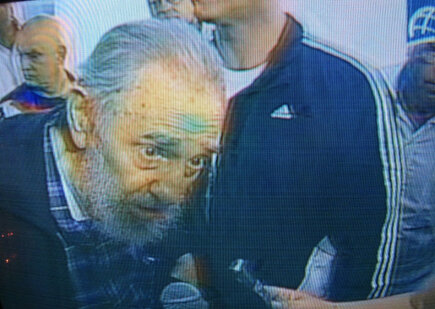
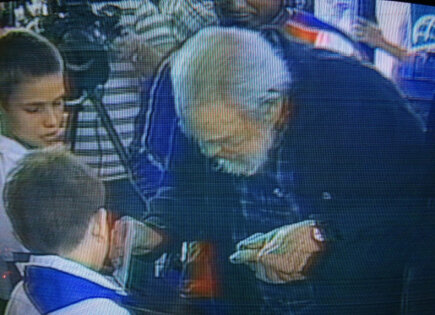




3 February 2013
Condolences to Antonio Rodiles and Family — You can help by recharging their cellphone / Translating Cuba #Cuba #AGRodiles

It is possible to add minutes to the phones of Cubans on the Island from anywhere in the world, and additional telephone minutes would very helpful in this difficult time.
The family’s number is: 53716460
Search on-line for “recharge Cuban cellphones” or you can go here: EZTop
People & Power: Cuba’s Ladies in White [and others] / Video from Al Jazeera #Cuba
This video voice over is not entirely accurate. For example at one point we are told “The Ladies in White are the only visible opposition to the government” — REALLY?! Here’s a “reminder link” to Pieces of the Island reporting on just a portion of those who visibly oppose the government.
Best to focus on the Cubans in the video speaking for themselves.
Academic Exchange on Law and Human Rights in Cuba / Estado de Sats
With the independent Cuban attorneys Yaremis Flores and Laritza Diversent (Cubalex), René Gómez Manzano (Agramontista Current), Antonio G. Rodiles (Mathematical Physicist) and students from the New York University Law School.
This video is 44 minutes long. There is a live interpreter translating the session into English in real time.
22 January 2013
What Does Estado de Sats (State of Sats) Mean?

Many people wonder what on earth does “sats” mean? Does it have something to do with the SAT I and SAT II college entrance exams in the United States? Could it be an acronym? Well, it’s none of that. Although it is (wrongly) written as an acronym, it is a Scandinavian term used in the theater world that means, “the point of departure in the action, the point when the movement begins and, in turn, the opposite of the sense in which the action unfolds.” A concept, in my opinion, quite convoluted and excessively subtle.
Prominent Cuban dissident Antonio Rodiles explained in an interview some time ago how he decided, in 2010, to apply this moniker to his think tank:
“We were thinking of a name for the project, and as a physicist I was leaning toward something relating to resonance, something that would encompass this state in which we all start to look and think in a similar direction… Then Esther [the actress Esther Cardoso] told us about Estado de Sats [State of Sats], a term used in the theater to describe the moment where all the energy is concentrated to explode on the stage, to put into action, finally, that which one has been preparing for a long time.”
From: CUBA al dente, Nicolas Aguila in El Pais
Citizens’ Demand for Another Cuba Activists Named “People of the Year” by Diario de Cuba / #Cuba
 People of the Year From Diario de Cuba
People of the Year From Diario de Cuba
Managers of the Citizens’ Demand ‘For Another Cuba’ — Activists
The managers of the Citizens’ Demand for Another Cuba have articulated an initiative capable of uniting a large share of the peaceful internal opposition, as well as hundreds of Cubans both on the Island as well as in exile. Activists, attorneys, journalists and independent artists, professionals, human rights defenders, bloggers and citizens in general, demand that the regime ratify and implement the the UN Covenants, signed in February 2008.
In 2012, the Citizens’ Demand for Another Cuba was delivered to the headquarters of the National Assembly as proof of the definitive will to fight for changes that allow a democratic transition in the nation.
Despite the repression and harassment to which they have been subjected, the managing group, headed by Antonio G. Rodiles, continues to publicize the initiative in the country, as well as to stress the need for public debate on issues such as the dual currency, immigration and travel restrictions, the rights of workers to a living wage, the right of all Cubans, wherever they live, to promote economic initiatives in the country, the demographic crisis, free access to the internet and new technologies, and the exercise of democracy.
This is Already a Path of No Return / Antonio Rodiles , Estado de SATS #Cuba
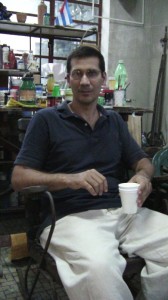
Interview with Antonio G. Rodiles, Estado de SATS Project Coordinator, by Ernesto Santana Zaldívar (from July 2012)
HAVANA, Cuba, www.cubanet.org
Introductory Note: On July 24, 2012, during the funeral of the opposition leader Oswaldo Payá, there were violent arrests of several activists and dissidents, among them Antonio Rodiles, who was held for 24 hours at the Fourth Police Station and interrogated by State Security, two years to the day after the first meeting organized by the Estado de SATS project. A few days earlier, Rodiles had granted this interview to Cubanet.
Estado de SATS (State of SATS) was born two years ago, but it has been mostly in the last year that this project has generated more interest and has experienced major growth, despite the efforts of the political police against it. Many people, on the other hand, are asking what could be the meaning of such a peculiar name. Antonio Rodiles explains it very clearly: “Estado de SATS is a term used on the theater that represents the moment when all the energy is concentrated to begin to action, or when an athlete is at the precise moment before the starting signal. It is the concentration that later explodes.”
There is no description more graphic and exact for the spirit of what emerged in July of 2010, when the first meeting was held at Casa Gaia, in Old Havana, organized by Rodiles, a mathematical physicist, and his friend Jorge Calaforra, a Cuban-Polish civil engineer, and with the notable support of the OMNI Project and the participation of the theater group Cuerpo Adentro and Darwin Estacio, who organized a painting exhibition.
Antonio Rodiles himself provides more details in this interview with Cubanet, in the midst of the intense undertaking that occupies most of his time.
Cubanet: How did the idea of the Estado de SATS project emerge and develop?
Antonio Rodiles: What we set out to do in the first meeting was to break the ice; to do something independent where we could generate debate about current topics from different perspectives, artists, intellectuals, professionals. It was a very interesting event that lasted three days, and the result was interesting. There were about seven lectures and three panels, an exhibit of paintings, a presentation of the film Memories of Underdevelopment, which had just been released, and on the last day there was a concert mixing jazz and hip hop.
This first concert was very positive and gave momentum to the idea of continuing, always maintaining the idea of the confluence of art and thinking. The reality of a country is very complex. There are different approaches, and we believe art has a lot to bring. There are things an intellectual or a professional sees that others don’t see, and an artist sees many of them. The ways of approaching problems are also different.
CN: We know that some time ago there were people who expressed the opinion that Estado de SATS was an “opposition-lite” project, prepared by the government. We know the answers you gave at that time. However, what would you respond today now that the project has continued to grow and develop?
AR: I think this is part of a strategy by State Security which has tried to spread this opinion to create internal divisions among political and social activists in Cuba. Everyone can say what they want, but it seems to me that this falls in the plane of conspiracy theories, because in the plane of reality we see that people with distinct visions and positions have participated here.
Just yesterday we had a meeting with three of the seventy-five former prisoners of the Black Spring, Eduardo Díaz Fleitas, José Daniel Ferrer and Ángel Moya. We also had Berta Soler, Wilfredo Vallín, Manuel Cuesta, Yoani Sánchez, Elizardo Sánchez, Alexis Jardines, Raudel Collazo, OMNI ZONA FRANCA and many more. They debated everything.
Ultimately, we have met with everyone to call upon the government directly with the Citizen Demand for Another Cuba, which is part of a campaign we are initiating to ask the government to ratify the Covenants they already signed (the United Nations Covenant of Civil Rights and Political Rights and the Covenant on Economic, Social and Cultural Rights). A campaign we want to carry out throughout the whole country and in which everyone who wants to can participate.
If anyone still thinks that this project is orchestrated by the government, they are definitely suffering from paranoia. Sometimes I think it’s important to talk about this so that it’s perfectly clear, but other times I feel that it’s a waste of time. Anyone, if they are well-intentioned, simply by looking at the work we’ve done this year, which for us has been huge, can understand the truth of our project. To entangle us in so many explanations and responses seems to me exactly what State Security wants: distract you with absurd details so you waste your time and energy.
CN: What importance do you attribute to the space for dialogue and reflection that this project has opened? In your view, what has been the impact of the work done so far?
AR: What has pleased me the most, personally, is being able to show the faces of civil society that the Cuban government tries to hide. They always say that those who oppose them are criminals, mercenaries, people with no vision of the future, no plan for the country, the worst of the worst. To show this range of faces and visions definitely gives the idea that when we can end this long nightmare, there is a clear prospect of a much better country.
It has also been very interesting to establish friendships with so many people, or that many individuals who didn’t know each other do now and they know what they think, what they see and how to collaborate. Another important aspect is that it has created a public space for debate. Here there is no room for the powers-that-be description: “you are my friend or you are my enemy.” Here people can coexist with others who think differently, but who ultimately also want a better country. That exchange is essential to a democracy.
It would be great is spaces like this could emerge across the entire country, if people could do it from their own inspiration. It’s very important to signal that tons of spaces like this exist in democratic societies. This may seem strange only in Cuba because we live under a totalitarian regime.
A process of maturation is indisputably happening in civil society, but new technologies are also contributing: to have a channel on YouTube, or to record a video and distribute it among people has a very important role, because people that see this can get interested in coming, participating, and knowing what happens. At first about fifteen or twenty people came, currently, at some meetings, we have observed over ninety or a hundred people.
CN: What new purposes and plans are fueling the project at this time?
AR: We would like projects like this to spread throughout the whole country, that here increasingly more people with different interests come, including from official institutions. That’s why we are focusing on greater awareness of what we do.
Another plan, on which we are concentrating great energy, is the Citizen Demand for Another Cuba. We believe it is very important that, from civil society, we demand our rights from the government and that, starting from those rights, there is a democratic transformation in the country. We are working very intensely to spread this whole conception of the new society, of what we want the change to be.
We are also very interested in the exchange with Cubans who are outside of Cuba. We have tried several times and we will keep trying. Almost always it has to be through recorded videos.
CN: Can you mention some of the procedures that the political police have used the to deter or derail the project?
AR: They have used many. Starting out, as they thought I would leave the country, they tried to blackmail me by taking away my permit to reside in the exterior, which they did a few months after the meetings began in my house. Then they threatened my parents with withdrawing the license they have to rent rooms, and even mentioned the possibility of taking our house.
The guests who are invited are threatened that, if they come, there will be reprisals. Also many of the public who come are warned not to come again. On some occasions they have organized operations around the house. We are very close to the offices of the National Aquarium and they normally mount their operations there, although lately they are being discreet.
They have also installed two permanent video cameras facing the house. Many time they harass people who leave the meetings, asking for their identity cards in an intimidating way. In short, they closely monitor us and the work they do is systematic in continuing to try to strangle people, especially economically.
The idea is to isolate you, set you apart, and continuously reduce the impact you can have with your work. I think that as the project continues to grow, they will become more nervous, but we hope that they understand that this is a path of no return.
CN: How do you see the current situation of our country, the real possibilities of change?
AR: Look, it seems to me that, almost a year and a half after the Communist Party Congress, which raised many expectations in some who are too optimistic, if not naive, and after the Party Conference, people have realized that it was all words. The government does not have the ability to change. It’s an ancient government with ancient ideas. There is no human capital in the halls of power and they are greatly afraid, because they know that there is discontent and the hopes of citizens are completely different from what they are offering.
This fear creates in them an unchanging attitude that corners us in an even more critical situation. Moreover, economically the country is in a quagmire. The measures taken have failed to capitalize on anything. It was because the company Repsol didn’t strike oil. There is no foreign investment of any magnitude.
And something that has become a sword of Damocles is the Chavez factor. If he will be re-elected or not, if he survives or not. The question of Venezuela is not only the more than one hundred thousand barrels of oil per day, but also the number of professionals who are working there. If they suddenly have to return to Cuba without the possibility of employment, they will become a mass with a high level of discontent.
I think that the political elite has been delaying and delaying solutions and what has been created is an accumulation of problems that are increasingly insoluble. I do not think they have the ability to solve anything because the problems are now completely overwhelming.
That’s where I think the Citizen Demand for Another Cuba plays an important role, presenting as a first step the restitution of our political, economic, cultural, social, civil rights. I think from that restitution there can clearly be a transition to democracy.
If, as citizens, we can organize a nationwide campaign where people mobilize and demand those rights from the government, and following the ratification of the Covenants there can be constitutional changes implemented in the penal code, and we recover the basic liberties, I definitely think the country would go forward to a radical change.
I think the most important thing is to think about how to make the change, specifically; not to say we want a transition or that Cuba wants a transition, but to think about what kind of country we want.
CN: Would you like to add anything to what you said?
AR: Yes, I would like to invite Cubans outside of Cuba to join this campaign. One way to help is to sign the Demand for Another Cuba. Another is to bring materials from outside, the printed text, the videos that have been done to explain the proposal of what we’re trying to do, and also to bring information about the Covenants and the Universal Declaration of Human Rights and to give it to their families.
Some may see this as something small, but if every household in Cuba could know what is being requested and in what form we are proposing changes in the country, that would be a tremendous step. As long as our desire for change is an abstraction, we won’t connect; but from the moment we say how to do it and we all push in that direction, the change happens, because the vast majority desires it.
The ratification of the Covenants would benefit the Yoruba Association, which advocates respect for gender differences, all the churches, the musicians, all citizens. So everyone should know the meaning of these Covenants and what benefits their ratification would bring.
I think the conditions are ripe for this to become a formidable campaign. I’ve talked to many people, and they tell me this demand seems very sensible, that it is relevant to beginning to untie this knot. Not even the government could say that this is a crazy idea.
The government must understand that the more prolonged the situation the worse the end will be, because there will be a larger quantity of accumulated problems. I think we are on the threshold of achieving a transition in Cuba, but only if it takes the pace it should. If not, the impulse will cool and then we would fall into apathy and the change could happen spontaneously and out of control, generating violence and leading us all into a dead end.
Ernesto Santana and Antonio Rodiles
Original interview: July 2012. Posted on Estado de Sats 17 January 2013.
